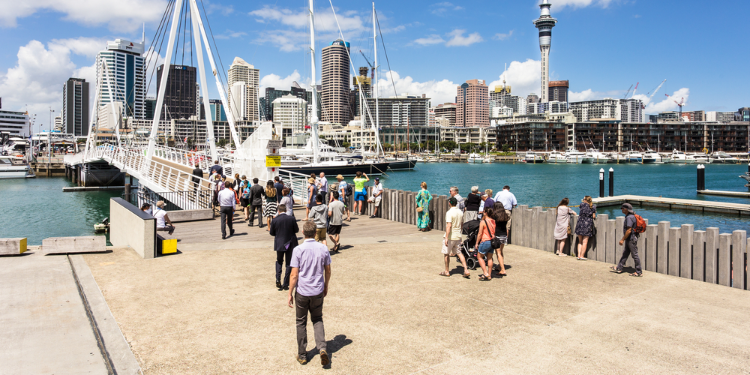Many of Ardern's initial electoral promises failed to materialize
In December 2022, a month before Ardern's resignation, the approval rating of her Labour Party was at a historic down of 27.5%, which was, as highlighted by the statistics company Roy Morgan Research, a whole 22.5% down from when she was re-elected in 2020. Indeed, as reported by the New Zealand magazine Stuff, she had been discussing a potential resignation with her party members, notably with the new PM Chris Hipkins, since December. The decision taken on January 19 wasn't a snap one but one taken after a month of discussions with her colleagues.
On the forum of Expat.com, a French expat in New Zealand by the username jeremyNZ expresses his opinions about her resignation. He says that Ardern's positive image as someone with “compassion and empathy” masked the absence of concrete results of her policies and initiatives. He cites immigration, housing and transport among the issues she failed to make concrete progress on, even as he recognizes her excellent crisis management at the beginning of the pandemic (2020) and during the Christchurch shooting (2019).
The reasons cited by jeremyNZ are echoed by multiple political analysts, media outlets and members of the opposition. In the Guardian, the journalist Virginia Harrison summarized the positive and negative reactions to Ardern's different decisions over 2017-2022. She was widely praised for her efficient handling of the first phases of Covid, but her broader domestic policies faced criticism. For instance, many critics say that her electoral promise to make housing affordable through the KiwiBuild scheme failed to prevent the accentuation of housing inequality over her 5 years in office.
During her first term, Ardern wanted to cut immigration by a third
One part of Ardern's track record that received criticism locally is how her initial electoral promises concerning immigration remained unfulfilled. Back when she was first elected in 2017, Ardern had promised to cut 20,000-30,000 out of the annual inbound migration number of approximately 70,000, i.e., by a third.
Ardern had told Reuters in 2017 that she wanted to reduce the number of immigrants in order to “have an immigration system that works for New Zealand,” to be able to selectively accept expats with skills needed in rural New Zealand and to attenuate the housing shortage in Auckland that is partly caused by urban overpopulation. Her hard immigration line was also partly a concession to the nationalist New Zealand First Party, whom she needed to form a coalition government. Indeed, she had appointed its leader, Winston Peters, as Deputy Prime Minister in her first term.
However, from 2017 to 2019, immigration never managed to go down. In The Sydney Morning Herald, Roshena Campbell, a Melbourne City councilor who's part of the opposition Liberal Party, highlights how net immigration had increased from 55,000 in October 2017 (the month Ardern became PM) to 79,000 in December 2019, before Covid hit. Immigration numbers only dropped because of the pandemic, not because of any specific immigration policy, highlights Campbell.
The post-pandemic labor shortage forced Ardern to ease her immigration policy
The pandemic changed everything about Ardern's immigration policy. As few people were able to enter New Zealand over 2020, 2021 and much of 2022, immigration dropped by itself. As Statz NZ shows, there was a 44% drop in the number of immigrants between 2021 and 2022. This created a severe labor shortage in the country, which has since then required more pro-immigration policies. Ardern had to back-pedal about her original electoral promise to cut immigration by a third.
In 2021, at the height of the pandemic, Ardern's government said that they would start focusing on high-skilled, high-wage migration pathways once the border can open. This would involve increasing the minimum requirements (education, salary, etc.) for skilled migrants and making the labor market test prior to hiring stricter. She also started giving more importance to the investor visa for the wealthy. Unlike in 2017, she didn't create a target immigration number, saying it was now the outcomes for the country and not “crude numbers” that mattered.
In 2022, as borders reopened and the labor shortage worsened, Ardern had to ease immigration even more – the opposite of her initial policy promises. The number of Working Holiday Visas (WHVs) for young, short-term workers was increased by 12,000 as a temporary measure to fill the labor gap in sectors like tourism and agriculture. In December 2022, a month before her resignation, while talking on the popular morning show AM, she hinted at upcoming “tweaks” in the immigration system. These “tweaks” should help New Zealand compete with other popular countries in attracting the best of skilled global talent in critical sectors like healthcare.
Even if Ardern has a mixed track record when it comes to policies, some expats in New Zealand say that they will miss the ideals she represented. Lywuist, another French expat in New Zealand, says on the forum of Expat.com that the “Jacinda / Trudeau / Macron” represented a “new generation of young political leaders who bring a different vision of politics, more progressive, more human” in contrast with authoritarian strongmen like Trump. He is worried that the gap left by her resignation will make it easier for strongmen to emerge (“What will the future hold for us if another Trump or Boris?”).
Business, tourism and agriculture leaders in New Zealand are saying that immigration should be a priority for the new prime minister, Chris Hipkins. In the magazine Stuff, the chief executive of Business New Zealand, Kirk Hope, said that businesses are in dire need of skilled workers and need stable immigration policies.
After meeting with business leaders in late January, Hipkins said that he isn't ruling out immigration changes. He hopes to strike the right balance between skilled, selective immigration and “activating the New Zealand workforce and getting Kiwis into work.” But as the next general elections need to be held in October 2023, it is yet unclear if Hipkins will be in office for long enough to implement any upcoming policies.
















